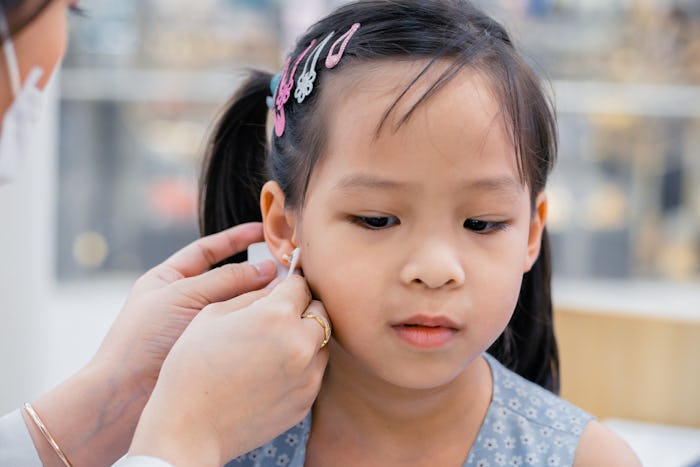Life

What Doctors Want You To Know About Ear Piercings
Many kids, particularly young girls, beg their parents to let them get their ears pierced so they can don the sparkly dangles that will make them look so adult. But before taking your child to the nearest piercing parlor, you may want to consider what doctors want you to know about getting your kid's ears pierced.
Depending on your cultural background, you may want your child's ears to be pierced as soon as they are born. In an interview with Romper, pediatrician Dr. Dyan Hes says some hospitals even offer it in the newborn nursery. Although Hes does elective ear piercing in her office, she suggests parents wait until their baby is at least 2 months old. Before that age, your baby won't have received their first set of immunizations, meaning infection and a subsequent sepsis workup may follow.
Still, some doctors suggest waiting even longer than 2 months. In an email exchange with Romper, pediatrician and dermatologist Dr. Tsippora Shainhouse says that waiting until the child is old enough to care for the piercings themselves can be a good idea. Care usually involves keeping the holes clean, turning the posts each day, and making sure you look carefully for any possible signs of rash, irritation, or infection.
But more important than your child's age is your child's opinion on the matter. If, once at the office, the child says they don't want their ears pierced, Hes won't pierce them — even if the parents or guardians say they want them to be done. "I just tell the parents, 'Clearly they’re not ready for it. I understand that you want it, but they don’t want it and when it’s a mutual decision that everybody on board wants it, then we’ll do it,,'" she say. "I never, ever force anybody because their parents say to get it done." If you think your kid might not want their ears pierced for whatever reason, it might be worth talking to them about it beforehand, especially if you feel strongly that they get it done, either for cultural or personal reasons.
Before piercing, Hes says she always makes sure to mark the spot where the hole will be on the kid's earlobes before piercing so that the parents or guardians who are present at the appointment can OK the location. "We don’t recommend that they put them too low, especially when they’re doing it so young, because earring holes sag," she says. "If you put them too low, by the time they’re 15 or 16, if they wear heavy earrings, they can have saggy earring holes and they can even split."
Prior to the piercing session, you want to know the material of the earrings and make sure they are safe for your child. "Use only nickel-free metals, especially for the initial piercing," Shainhouse says. "Consider only wearing precious metal posts, including silver, gold, [or] platinum, which are less likely to cause a reaction or rash." Hes adds that in her office, they use earrings with surgical steel posts for the initial piercing. These, like precious metals, are less likely to result in dermatitis or other reactions.
In addition to properly caring for the piercings, make sure to leave the earrings used for the initial piercing in the holes long enough to guarantee that the hole is the right size and stays open. Hes recommends patients leave earrings in for at least the first six weeks after getting their ears pierced. For active kids who participate in sports and other activities, it can make timing the piercings a bit tricky, as you're usually required to remove your earrings to participate. Hes says that if you remove earrings too soon and forget to replace them, holes can begin to close within a week or so.
Once your kid is ready to change out their earrings — or move on to something slightly more dangly — both Shainhouse and Hes recommend huggie earrings, which hang close to the earlobe so there's less of a chance that something will get snagged. Still, opting for surgical steel or nickel-free is a good idea to avoid any negative reactions to the metal. If you do notice pus or anything else that seems like a reaction, contact your child's doctor for guidance.
Ear piercing is a sort of rite of passage for many kids, but that doesn't mean there still isn't a lot that you need to consider. Knowing what you're getting yourself — and them — into can help make the whole experience a happier one.